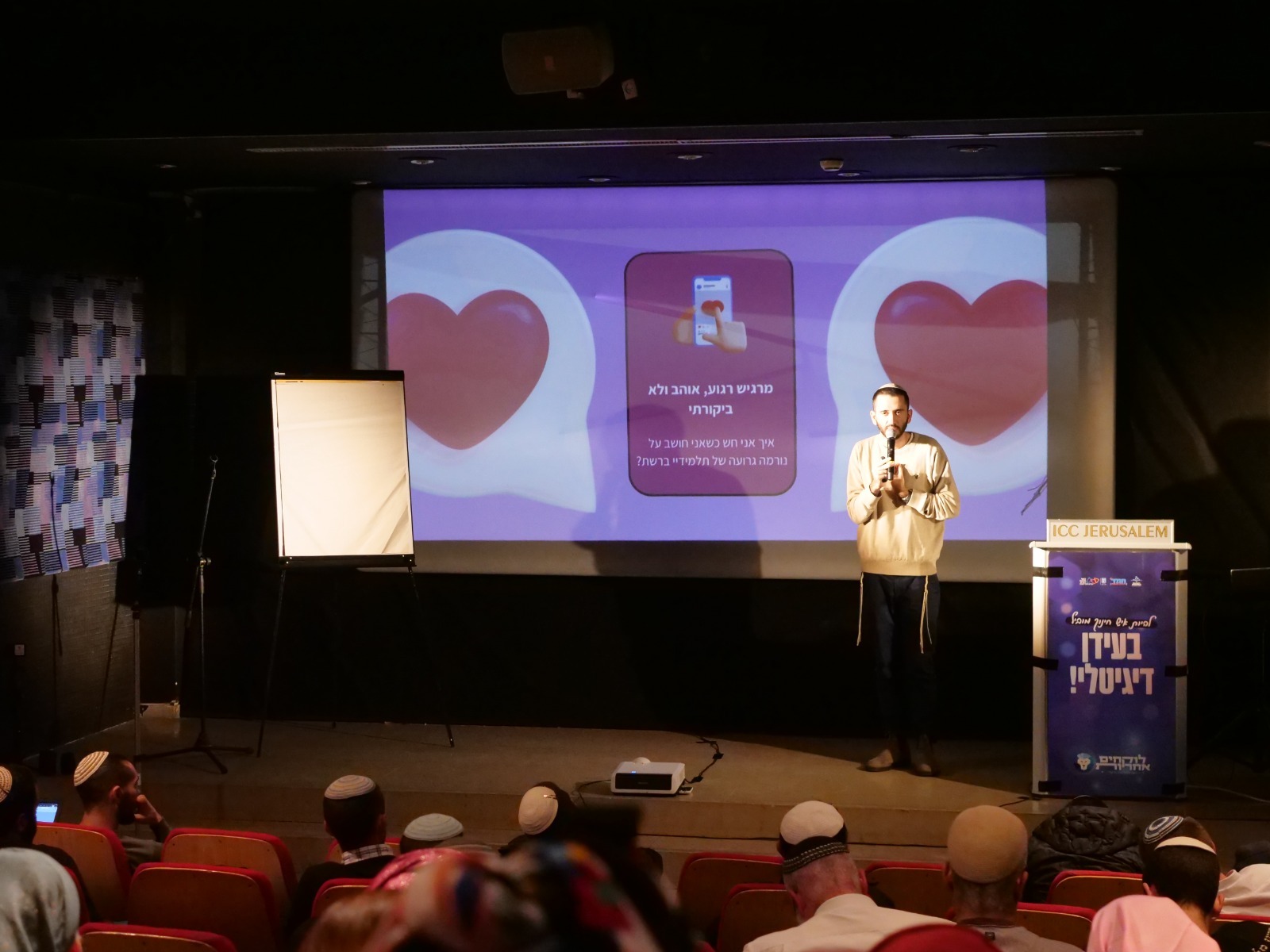How Many Times Have We Told Our Child: Get Off Those Screens, Why Are You Stuck There?
Saar Halak, deputy director of the "Taking Responsibility" NGO, discusses the difficult feelings parents have about their children being glued to screens, the dangers of setting boundaries, and what is important to do instead.
 (Photo: shutterstock)
(Photo: shutterstock)When we come home and see our child sitting in front of a computer or smartphone, what's the first feeling we have? Saar Halak, the deputy director of the "Taking Responsibility" NGO, knows the answer well: "Anger, frustration, pain," he says. "These are the emotions parents deal with regularly. They wonder aloud or to themselves - why is the child wasting their time there? They feel like shaking them, telling them, 'Come on, get off those screens, why are you stuck there? Start living your life.'"
Saar has something to say about this instinctive reaction. He doesn't endorse the screens nor dismiss them altogether. Instead, he proposes an alternative perspective on this daily struggle that shakes so many of us.
Digital Immigrants
The "Taking Responsibility" NGO was founded by a group of young people seven years ago when they could no longer endure the situation. Saar joined them early on as a volunteer. "We saw too many people harmed by improper use of the internet, and on the other hand, we realized it's impossible to live without it," he says. "We started helping teenagers and adults alike, realizing there needed to be education and guidance to use these tools healthily, balancedly, and productively. Over time, our activities expanded to other channels. Today, the NGO offers personal coaching to deal with online challenges, various workshops on the topic, finding technological solutions, promoting legislation on the matter, and also mobilizing hundreds of volunteers who spread the information and help more people."
 (Saar Halak (Photo: Avi Friedman
(Saar Halak (Photo: Avi FriedmanSo what's the problem with our desire to get the kids off the screen?
"Before discussing the problem, let's explain the background. Generally, our parental approach to the world of screens is judgmental and critical. It hurts to see our children in front of a screen. We come from a different generation - in our childhood, there weren't screens, at least not as accessible as they are today. The activities associated with childhood in our minds are entirely different. We think children should meet friends, talk face-to-face, play outside. Scrolling a screen with a finger is not part of that, and even for those who grew up with television, smartphones are another story entirely." Our children, however, see screens in a different light. "They find joy and comfort in front of the screen, and they don't understand what we want from them," Saar continues. "Moreover - alongside the challenges and dangers, our children also gain tangible benefits from the screen. They have entertainment, social interaction, interests, new learning methods, and a way to occupy themselves with minimal effort."
The intergenerational gap between us and our children results in significant costs. "We are frustrated over the inability to set clear rules at home regarding screens, and our children don't understand what we want from them. They feel like we're always fighting them, and this battle never ends well. Either we give in and feel like we've failed in parenting, or they get angry and isolate themselves. In families where the boundaries on the topic are stricter, children reach adolescence, buy themselves a device for a few hundred shekels, and may find themselves in the worst places. This perception gap between us and our children creates a kind of rift."
Saar sharpens the difference between us and our kids even more. "We got our first smartphones between the ages of high school graduation and adulthood. Our identities were already developed, and we had social skills. In research, we're called 'digital immigrants' - because we weren't born into the digital reality but migrated there. Our children, on the other hand, were born into a world where screens are everywhere, and this change affects them."
One of the influences on our children is the way they form social connections. "We don't understand how social bonds can develop through screens, whereas our children consider making connections via messages, video calls, and chats natural. It sounds odd to us, but if we look back about 60 years to the time when telephones entered homes, back then parents were frustrated when their children talked with friends over the phone instead of meeting them face-to-face. This is precisely the generational gap existing now, and today - in the age of screens, communication via the screen becomes legitimate."
Virtual Profit
Understanding this can change our entire attitude towards the child and the device in their hands. "If we look at the screen in front of the kid and all we see is evil, stupidity, and time wastage, our whole approach to it will be negative," Saar explains. "While in reality, our child's experience is gaining real value there. Video games, for instance, are somewhat akin to our idea of playing ball back in the day. So when we come and rudely block it all, it puts them in a massive defensive stance. The screen has aspects related to their identity and personality, and for them, defending it is like defending their home, what is precious and important to them."
Good values for our children on the screen? Seems like opening a bad path
"A child may consume even low-quality content, but internally, they still gain something. Sometimes it's satisfying curiosity, sometimes it's feelings of tension and challenge - as in video games, and sometimes it's simply the capacity to alleviate hours of boredom, which is immensely significant to them."
Resolving the conflict depends on us. "We must recognize that screens have value for our children and learn what it is. Clearly, harmful elements exist within the screen, but what benefits our kids there? If we approach not from a decisive, unyielding, hyper-critical place but a listening and observing standpoint, we discover that gain indeed exists, and that's what guides us to the correct action."
 Hanukkah Conference, 2022 (Photo: Avi Friedman)
Hanukkah Conference, 2022 (Photo: Avi Friedman)What can we do about it?
"Once we understand the benefit, we can provide our children an alternative that yields the same benefits, only in the real world. For example, if a child watches many films, we can forcibly take away the screen and leave them frustrated and pained. Alternatively, we can think about what they gain from those films. Maybe they face social difficulties and prefer running to a captivating movie instead of confronting friends? Perhaps they're simply home alone for many hours and need something to alleviate the boredom? Once we detect the root problem, we can arrive at a solution. In our example, we need to create a social alternative that meets their needs. This isn't always easy or immediate, but it is the real way to help them."
Real-world problem-solving constitutes a significant point. "That's what will prevent them from retreating into screens. Moreover, to give our children meaningful content during their leisure time, we must bring it to them. If they do have screen time, it's important to fill it with positive content. They could learn a course - in English, woodworking, knitting, you name it, or watch clean content conveying a positive message. Even when a child wants to play, for example, five stones on the computer, we can consider if allowing it is reasonable, understanding that sometimes this is how they entertain themselves. The problem mainly arises when screen time takes precedence over other things and exceeds the appropriate duration, causing avoidance of study, communication, and effort, leading to atrophy. In such situations, those impairing a child's function, a change is needed. However, if they're healthy and the screen also serves as a play area, it's worth considering how correct it is to allow it."
There is a difficult statement here, which in some place legitimizes screens
"True, it's important to recall we're faithful to the world of Torah. But with all the pain, the question is - what's the price of complete prevention? In homes where there are no screens at all, the boundary is clear, but how many of us have them? Sadly, after all the experts have voiced their opinions, people are voting with their feet. Then the question arises - what happens when we try to completely remove our child from the screen? Often, when parents see the issue only negatively, their children encounter screens where there's no oversight and control, making the downhill slope much steeper. We've worked with at-risk youth through welfare departments, and the prevalent phenomenon is that especially those coming from homes without conversation around the subject face more significant setbacks. These young people step into the world without knowing how to correctly deal with screen challenges, lacking proper boundaries in the field, and no one to ask, as discussing it is forbidden."
Especially painful is the lack of someone to ask. "A child conducts a mental simulation of what will happen after asking a certain question. They think to themselves - 'If I tell my parents a friend showed me a certain video, what will they say?' When their parents respond rigidly about screens, they know the answer will be appropriate - 'Why are you there? We told you not to watch this!' Such a child understands it’s not worth asking or sharing what they saw. Conversely, a child feeling loved, knowing they can talk to their parents about any topic in the world, will share and get proper guidance from them."
Saar suggests a small tip for parents, the "three-finger rule." "The rule is that when a child points with three fingers, they're essentially saying - 'I want to say or ask something now, without being criticized.' This gives them a safe space to share what's on their mind and allows parents to be in a genuinely listening position, answering thoughtfully and not from their fears. This way, it’s possible to start fostering a more permissive conversation at home."
Explanation, Explanation, Explanation
According to Saar, all this requires a shift in perspective. "It's time to talk to our children about what's happening, to be a resource for their questions. It's not enough to set boundaries because screens are everywhere, and the content appearing on them scrolls at lightning speed. We're not encouraging screen use, certainly not, but alongside the boundaries - explaining. Explaining even the simple things, like why we have internet filters. Only then the rules will embed into the children's identity, and they can uphold them. Here, we a thousand times prefer compromising on a boundary where the child agrees with us, than to set too rigid a line and lose them."
 (Photo: shutterstock)
(Photo: shutterstock)An interesting study in the field illustrates the matter. "Psychologist Dr. Yaron Sela examined the capability to reduce screen engagement hours among children," Saar describes. "He studied two family groups, restricted the screen time in the first using special software, while in the second he imposed the same time limits but talked to them about it. He explained to the children of those families the importance of limiting screen time, sat down to think with them about potential activities during the newfound free time, and provided support for challenges arising around the topic. Four weeks later, the viewing restrictions were removed. In the first group, the children returned to the previous long watching hours, while in the second, the screen hours remained low. This research demonstrated how healthy discourse embeds the rules in children's minds, enabling them to impose healthy boundaries."
On a personal level, Saar also sees importance in implementing these ideas. "Sometimes the kids ask - why do we have filters and protection at home? And we talk about how not every content can enter our home. My son himself comes to ask if I can check a particular video for viewing. By the way, through the organization, we were exposed to a story about two good, religious girls who went severely off course. Although all devices at home were filtered, one of their mothers' phones wasn't. The girls watched inappropriate content through it, leading to their downfall. This example showcased how crucial it is to talk with the kids, even when everything around appears fine. We don't know what they'll encounter in the future, and it's important to build within them the ability to handle the topic."
In conclusion, Saar touches on an additional point: our personal addiction to screens. "Here too, it's important to say it's time to lower judgment and criticism," he emphasizes. "We can't be harsh with ourselves every time we waste time on our mobile devices. If for every minute wasted on the internet we assure ourselves of doom, we won't succeed in moving forward. Facing screen dependence requires compassion, and it's important to maintain a conversation on the topic with ourselves. All this stems from faith in the good within us, for that's the only way to grow successfully."

